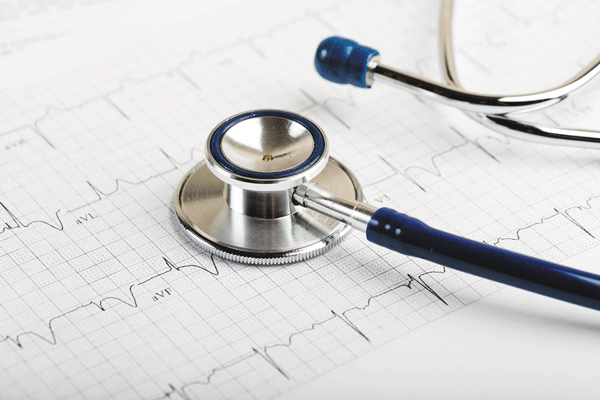
5 timeless habits for better health

What are the symptoms of prostate cancer?

Is your breakfast cereal healthy?

When pain signals an emergency: Symptoms you should never ignore

Does exercise give you energy?

Acupuncture for pain relief: How it works and what to expect

How to avoid jet lag: Tips for staying alert when you travel

Biofeedback therapy: How it works and how it can help relieve pain

Best vitamins and minerals for energy

Should you take probiotics with antibiotics?
Heart Health Archive
Articles
Add stretches to your exercise routine
They can help you stay flexible and active enough to keep your heart in good shape.
It's no secret that as you age, your body becomes less flexible. Your muscles aren't quite as supple and your joints are little stiffer than when you were younger. As a result, getting regular, heart-protecting exercise may be more challenging.
That's why stretching — the deliberate lengthening of muscles to increase flexibility and range of motion — can be especially helpful after middle age. Yet many people are confused about the different stretching techniques and the best time to do them, says sports medicine physician Dr. Adam Tenforde, assistant professor of physical medicine and rehabilitation at Harvard Medical School.
Legume of the month
Image: © Kateryna_Mostova/Getty Images
Editor's note: This year, we're highlighting legumes on this page. Low in fat but rich in protein and other nutrients, they're a staple of plant-based eating. Starting in February, we'll feature a different legume each month, along with information and recipe tips from different cultures around the world.
But we're starting off with the basics: a simple recipe for cooking dried beans.
Two daily servings of dairy: Good for your heart?
Research we're watching
Image: © nehopelon/Getty Images
People whose daily diets include at least two servings per day of milk, yogurt, or cheese appear to have a lower risk of heart disease, stroke, or death than people who don't consume dairy products.
The findings, published Sept. 11, 2018, in The Lancet, were based on food questionnaires from more than 136,000 people from 21 countries. After a follow-up that lasted an average of nine years, researchers found that adults who consumed two or more servings of dairy each day had a 22% lower risk for heart disease, a 34% lower risk for stroke, and a 23% lower risk of heart-related death. Observational studies such as this one cannot prove cause and effect. But dairy-based foods contain vitamins D and K, calcium, and other nutrients thought to be good for cardiovascular health. The findings support the benefits of all types of dairy, including full-fat versions. However, current guidelines still recommend nonfat or low-fat milk, yogurt, and cheese, which contain fewer calories and less saturated fat.
E-cigarettes boost the risk of heart attack
Research we're watching
Image: © Neydtstock/Getty Images
Electronic cigarettes, which are battery-operated devices that create a nicotine-filled vapor, are often touted as a less-risky alternative to conventional cigarettes. But daily e-cigarette use may nearly double a person's risk of a heart attack, according to a study in the October 2018 American Journal of Preventive Medicine.
The data came from nearly 70,000 people who took part in two National Health Interview Surveys. Compared with nonsmokers, people who smoked regular cigarettes daily nearly tripled their heart attack risk, compared with a nearly doubled risk among people who used only e-cigarettes. However, about two-thirds of current e-cigarette users also smoked regular cigarettes. Using both products daily was linked to a nearly fivefold increase in heart attack risk.
Monitoring a narrowed, stiff aortic valve
Image: © bowdenimages/Thinkstock
Research we're watching
As some people age, the valve leading to the heart's largest vessel (aorta) can become clogged with calcium deposits, causing the valve to stiffen and narrow. A study in the Oct. 3, 2018, JAMA Cardiology looked at strategies for treating the condition, known as aortic stenosis.
Aortic stenosis — which generally causes no symptoms for many years — is usually detected during a routine check-up. Doctors usually recommend replacing the aortic valve soon after symptoms such as chest pain, shortness of breath, or fainting occur, as these can foretell sudden cardiac death. However, the best strategy for people who have severe aortic stenosis but no symptoms is less clear.
Atrial fibrillation may increase your risk of dementia
Image: Valeriya/Thinkstock
In the journals
People with atrial fibrillation, or afib, a type of irregular heartbeat that is linked with stroke, also may have a greater risk of dementia than those without the condition, according to a study published online Oct. 10, 2018, by Neurology.
Researchers recorded medical data from 2,685 people, average age 73. None of them had dementia and 243 had afib. After nine years, another 279 people developed afib. The researchers found that people with afib showed a faster rate of decline in thinking and memory skills than those without the condition, and were 40% more likely to develop dementia.
Regular exercise helps reverse age-related changes in your heart
Moderate workouts on most days of the week may be enough for heart-healing benefits.
Image: © kali9/Getty Images
Good news: If you've spent most of your life as a competitive master athlete who trains more than six days a week (in addition to competitions) your heart probably looks and performs like one that is much younger than its chronological age.
Doesn't sound like you? Don't worry, there's also some good news for the rest of us. Even if you've spent more time hanging out than working out over the past few decades, starting an exercise program in middle age might earn you a younger-looking heart too.
Benefits of a healthy diet — with or without weight loss
Can you improve your health by changing your diet, even if you are unable to lose weight? Three studies examined different variations on the DASH diet, and all found improvements in blood pressure, plus lower LDL cholesterol and triglycerides in one instance — even without weight loss.
Certain pain relievers could harm your heart
But use is primarily a concern for people who take them over a long period or who have certain health risks.
Image: © clu/Getty Images
Numerous studies in recent years have raised concerns that common pain relievers known as nonsteroidal anti-inflammatory drugs (NSAIDs) increase the risk of cardiovascular problems, such as heart attack and stroke.
A study published September 4 in The BMJ seems to confirm the risks associated with NSAIDs and notes that one medication in particular — diclofenac (Voltaren) — is associated with even higher risks to cardiovascular health than others in the same category.

5 timeless habits for better health

What are the symptoms of prostate cancer?

Is your breakfast cereal healthy?

When pain signals an emergency: Symptoms you should never ignore

Does exercise give you energy?

Acupuncture for pain relief: How it works and what to expect

How to avoid jet lag: Tips for staying alert when you travel

Biofeedback therapy: How it works and how it can help relieve pain

Best vitamins and minerals for energy

Should you take probiotics with antibiotics?
Free Healthbeat Signup
Get the latest in health news delivered to your inbox!
Sign Up











